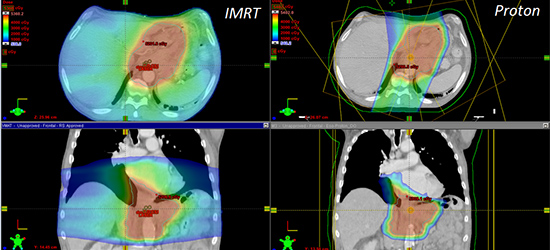Tri-Modality Therapy to Treat Esophageal Cancer
In later stage esophageal cancer (stages 2-3), the cancer has spread deeper into the esophageal wall. Treatment for these cancers may involve trimodality therapy, a combination of chemotherapy, radiation and surgery. It is most common for chemotherapy and radiation to take place before surgery. However, often patients with later stage cancer have difficulty or inability in swallowing food or liquid. When the cancer causes swallowing problems, weight loss, esophageal obstruction or vomiting, a gastroenterologist will use an endoscopic procedure to open up the esophagus. This may involve the placement of a stent to keep the esophagus open. This allows the patient to proceed first with chemotherapy and radiation therapy, which is associated with better long-term survival rates.
When a patient presents with stage 2-3 esophageal cancer at UMGCCC, he or she is evaluated by a multidisciplinary team. This team consists of a medical oncologist, radiation oncologist, and thoracic surgeon. These experts tailor a treatment plan to the patient's individual cancer and other factors such as age, functional status and other health conditions.
Treatment usually begins with chemotherapy and radiation given at the same time in a treatment regimen than usually lasts 5-6 weeks. Four to six weeks of the last dose of radiation, a restaging PET/CT scan is done. If the cancer has not spread, then the patient is a candidate for surgery. Other testing may be required to determine the patient's health (testing of the heart and lungs) to make sure it is safe for the patient to have surgery.
Trimodality therapy not only gives patients a survival advantage, but it sometimes "downstages" the cancer to an earlier stage. This gives patients the best chance to have their cancer completely removed by surgery.
Radiation Therapy for Esophageal Cancer
Surgical Options for Esophageal Cancer
To make an appointment with an esophageal cancer expert, please call 410-328-7904.

 However, the radiation oncologists at UMGCCC also have access to proton therapy, the most advanced, precise radiation therapy available. Only available at about 25 centers across the U.S., proton therapy stops the radiation dose at the tumor site so it doesn't reach the healthy tissues behind it. This significantly decreases the amount of radiation that reaches the heart and lungs of esophageal cancer patients. Because it is more precise than traditional radiation therapy, proton therapy has also been associated with fewer complications after a patient has surgery. Read more about
However, the radiation oncologists at UMGCCC also have access to proton therapy, the most advanced, precise radiation therapy available. Only available at about 25 centers across the U.S., proton therapy stops the radiation dose at the tumor site so it doesn't reach the healthy tissues behind it. This significantly decreases the amount of radiation that reaches the heart and lungs of esophageal cancer patients. Because it is more precise than traditional radiation therapy, proton therapy has also been associated with fewer complications after a patient has surgery. Read more about